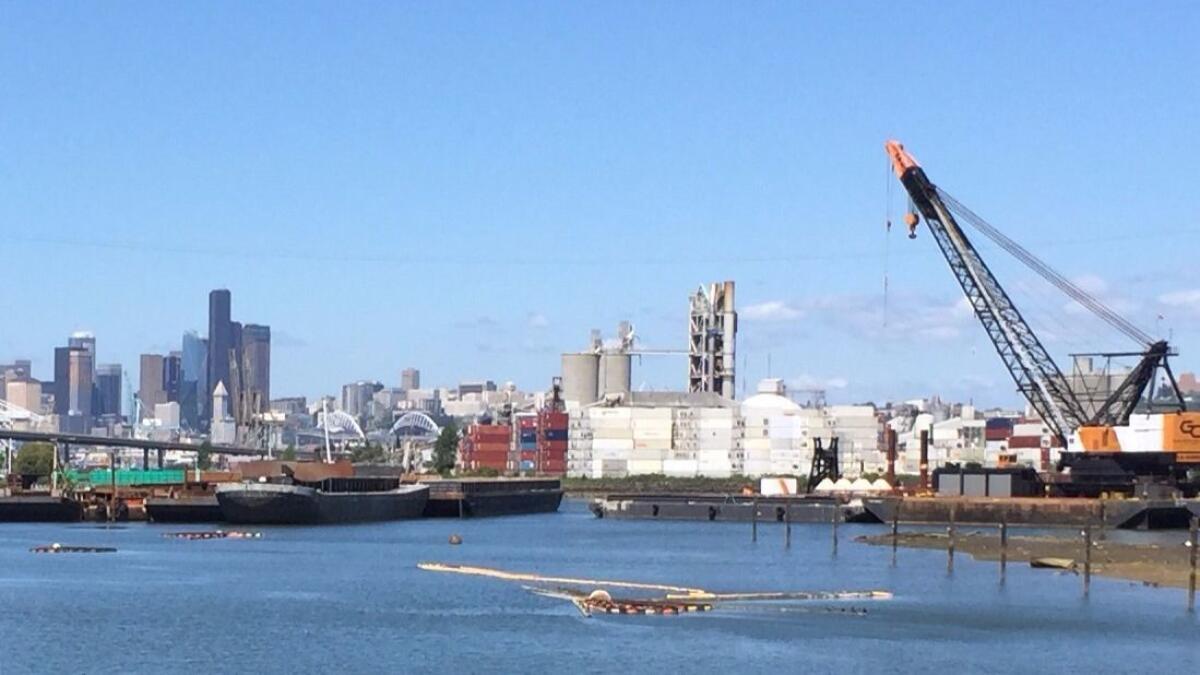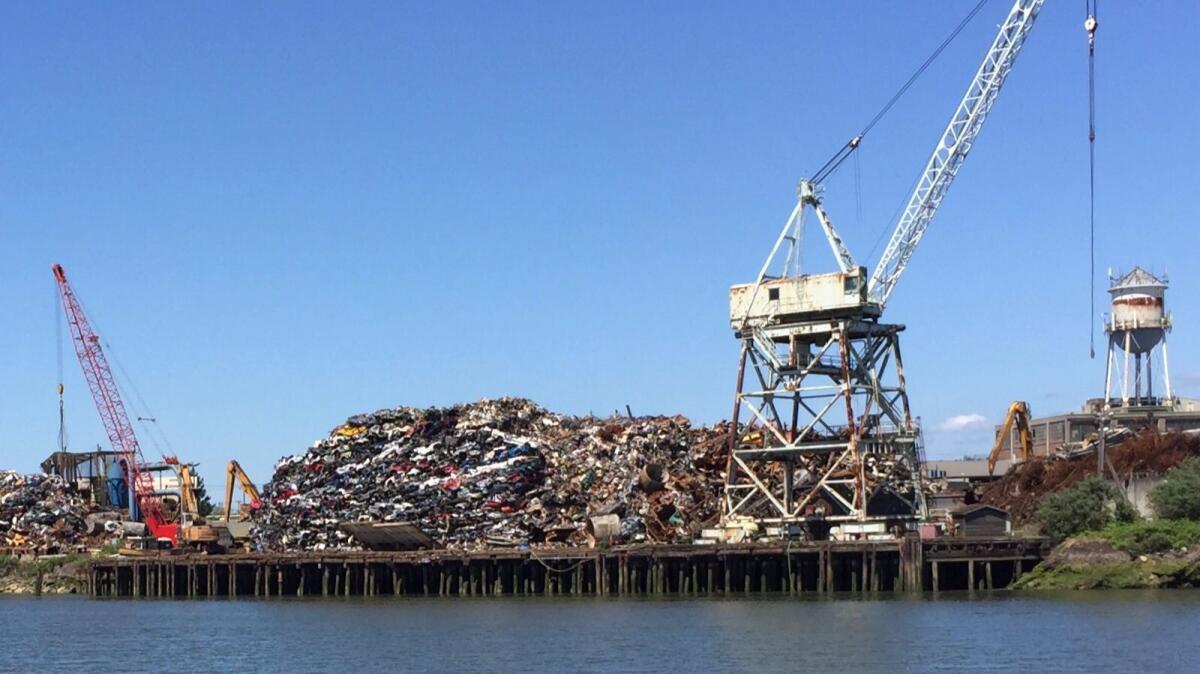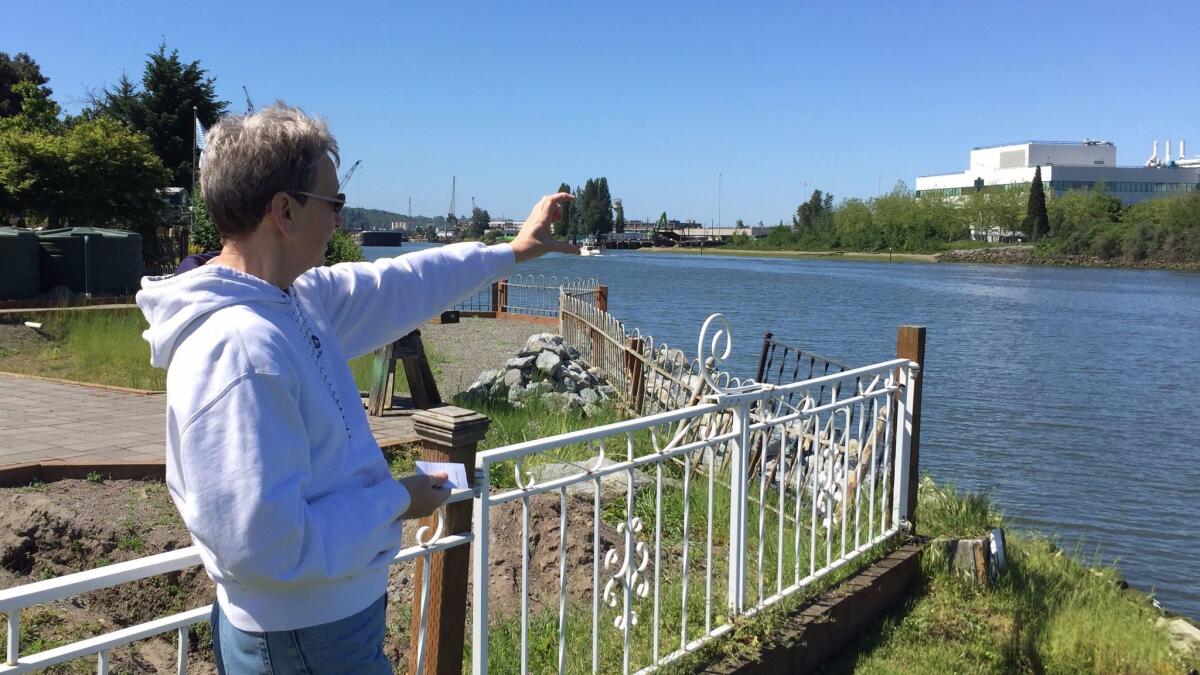Trump’s EPA wants to focus on Superfund cleanups. Will its plans take climate change into account?

- Share via
Reporting from Seattle — The pioneers who built Seattle polluted and plumbed the lower Duwamish River for a century, straightening its wild curves and saturating its sediment with toxic chemicals from an asphalt plant, Boeing manufacturing facilities and other industries.
The damage was so severe that the last five miles of the river before it empties into Elliott Bay were designated a federal Superfund cleanup site in 2001 — an official stamp of devastation that came all too late in the view of Native American tribes that once fished for salmon here.
Now, even as progress has been made in the $342-million cleanup, the river and the effort to clean it face a new threat: climate change. Scientists say that rising seas could flood riverbanks by midcentury and that potential increases in storm-water runoff and downstream flows could bore into sediment and release toxins sealed below.
The challenges are not isolated to the Duwamish. Experts say that Superfund sites across the country — including Portland Harbor in Oregon, naval bases in Virginia and landfills in the Midwest — are at risk from the increasingly extreme weather and rising sea levels associated with climate change, and that longstanding methods for cleaning them may need to be rethought.
Under President Obama, the Environmental Protection Agency began doing just that, proposing technical guidelines in 2015 to make Superfund cleanups more resilient to climate change.
Yet how the Trump administration will address the dual threat of past and future is unclear.
Scott Pruitt, the new head of the EPA, has said cleaning up Superfund sites is at the top of his “back to basics” approach for the agency. He has promised to streamline the Superfund process, including by getting directly involved with large projects.
Like Trump, Pruitt has repeatedly questioned the broad scientific consensus that human activity is driving climate change. He has had information about climate science removed from the EPA’s website and played a prominent role in Trump’s recent decision to withdraw from the landmark Paris climate accord.
Environmental groups worry that Pruitt will favor inexpensive cleanup methods that fail to withstand the test of time.
“Climate change impacts everything,” said Gregg Small, executive director of the nonprofit Climate Solutions, based in Seattle. “You cannot solve any problem if you are not dealing with climate change, because it exacerbates every other problem in the environment.”
The Superfund program was once among the nation’s highest-profile environmental efforts. For four decades, it has identified and sought to remediate sites contaminated by industrial waste, runoff, mining, chemical use and other types of pollution.
Rivers and ports have frequently been designated Superfund sites, as have older manufacturing locations. Cleanups may involve removing acres of contaminated soil and replacing it with healthy soil, “capping” a site with a heavy layer of new soil, or trusting nature to slowly break down pollutants.
But an increasing understanding of climate change presented new questions. Would capped toxins at a Superfund site stay sealed amid more extreme weather? What if storm water surged into an area more powerfully than in the past? What if floods forecast to occur once in a century happened once every couple decades?
“A system that was designed for remedial action under one set of circumstances may fail completely under other circumstances,” said Peter deFur, a longtime consultant on Superfund cleanups who is based in Virginia.
“Nobody knows what Pruitt means by ‘back to basics,’” he said. “If it means requiring air permits, water permits, cleaning up Superfund sites — that’s great, we want to do that. But if ‘back to basics’ means forgetting about climate change, we’re going to fail.”
Those concerns have also been raised within the EPA. On March 28, Michael Cox, a longtime climate change expert for the agency, helped lead a workshop to consider how the climate might affect the cleanup of the Duwamish.
Three days later, Cox retired — and made his feelings known in a blistering open letter to Pruitt that was circulated widely within the agency and eventually made it to the news media.
“You will continue to undermine your credibility and integrity with EPA staff, and the majority of the public, if you continue to question this basic science of climate change,” Cox wrote.
In an interview this month, Cox said prioritizing Superfund cleanups could not be separated from accepting climate science.
“If we’re spending hundreds and hundreds of millions of dollars on cleanups, I sure hope we’re looking out 50, 60, 70 years to make sure they are resilient to the changing climate,” he said. “Why in the heck would we spend close to half a billion dollars on something that’s not going to stand up over time? It doesn’t make any sense.”
Dave Schuchardt, the Superfund program manager for Seattle Public Utilities, was among dozens of federal, state and local officials who attended the March workshop. Schuchardt said in an interview that stronger storm and river flows projected under climate change can “scour” away at layers of soil intended to seal in toxins.
“As we work through that set of decision points, we’ll want to consider how this particular river might be affected by climate change and how it might or might not affect the scouring situation,” Schuchardt said.
EPA officials in Washington did not respond to repeated requests for comment for this story.
Dagmar Cronn, who lives with her husband in a small house overlooking the Duwamish, spent two years watching Boeing spend millions of dollars removing waste from the river. She said she was pleased with the work, even as she has seen the river wash away trees on her bank and slowly erode her property.
But Cronn, 70, also imagined unprecedented sea levels and storm flows churning the riverbed and the toxins it contains.
“They could all be picked up and carried God knows where,” she said.


More to Read
Sign up for Essential California
The most important California stories and recommendations in your inbox every morning.
You may occasionally receive promotional content from the Los Angeles Times.











